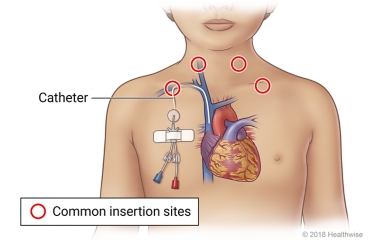
What is tunneled catheter placement?
A tunneled catheter is a soft, flexible tube that runs under your child's skin from a vein in your child's chest or neck to a large vein near the heart. This catheter is a type of central vascular access device.
The catheter is used to give your child medicine, fluids, nutrients, or blood products for up to several weeks or more. The fluids are put through the central line so that they move quickly into your child's bloodstream. The same line can be used for a while, so your child isn't poked with a needle every time.
The line also can be used to take out blood for tests.
Usually a short section of the line stays outside of the body. The place where the line leaves the skin is called the exit site. Sometimes the line has two or three ends so your child can get more than one medicine at a time. These ends are called lumens. The end of each lumen is covered with a cap.
Before placing the catheter, the doctor may give your child medicine to sleep or feel relaxed. Your child may feel a little pain when the doctor gives the medicine. The doctor will then insert the catheter.
How do you prepare for the procedure?
Procedures can be stressful for both your child and you. This information will help you understand what you can expect. And it will help you safely prepare for your child's procedure.
 Preparing for the procedure
Preparing for the procedure
- Talk to your child about the procedure. Say that it will help your child get the medicines that your child needs. Hospitals know how to take care of children. The staff will do all they can to make it easier for your child.
- Understand exactly what procedure is planned, along with the risks, benefits, and other options.
- Tell the doctor ALL the medicines, vitamins, supplements, and herbal remedies your child takes. Some may increase the risk of problems during the procedure. Your doctor will tell you if your child should stop taking any of them before the procedure and how soon to do it.
- Ask if a special tour of the surgery area and hospital is available. This may make your child feel less nervous about what happens.
- Plan for your child's recovery time. Your child may need more of your time right after the surgery, both for care and for comfort.
The day before the procedure
- A nurse may call you (or you may need to call the hospital). This is to confirm the time and date of your child's procedure and answer any questions.
- Remember to follow your doctor's instructions about your child taking or stopping medicines before the procedure. This includes over-the-counter medicines.
What happens on the day of the procedure?
- Follow the instructions exactly about when your child should stop eating and drinking. If you don't, the procedure may be canceled. If your doctor told you to have your child take any medicines on the day of the procedure, have your child take them with only a sip of water.
- Follow the doctor's instructions about when your child should bathe or shower before the procedure. Do not apply lotion or deodorant.
- Your child may brush their teeth. But tell your child not to swallow any toothpaste or water.
- Do not let your child wear contact lenses. Bring your child's glasses or contact lens case.
- Be sure your child has something that's a reminder of home. A special stuffed animal, toy, or blanket may be comforting. For an older child, it might be a book or music.
 At the hospital or surgery center
At the hospital or surgery center
- A parent or legal guardian must accompany your child.
- Your child will be kept comfortable and safe by the anesthesia provider. Your child may get medicine to bring on a light sleep or to help your child relax. The area being worked on will be numb.
- The procedure will take about 1 hour.
- After the procedure, your child will be taken to the recovery room. As your child wakes up, the recovery staff will monitor your child's condition. The doctor will talk to you about the procedure.
- You will probably be able to take your child home after he or she is awake and alert and the doctor says it's okay.
When should you call your doctor?
- You have questions or concerns.
- You don't understand how to prepare your child for the procedure.
- Your child becomes ill before the procedure (such as fever, flu, or a cold).
- You need to reschedule or have changed your mind about your child having the procedure.
Where can you learn more?
Go to http://www.healthwise.net/patientEd
Enter T460 in the search box to learn more about "Tunneled Catheter: Before Your Child's Procedure".
Current as of: March 26, 2025
Author: Ignite Healthwise, LLC Staff
Clinical Review Board
All Ignite Healthwise, LLC education is reviewed by a team that includes physicians, nurses, advanced practitioners, registered dieticians, and other healthcare professionals.

